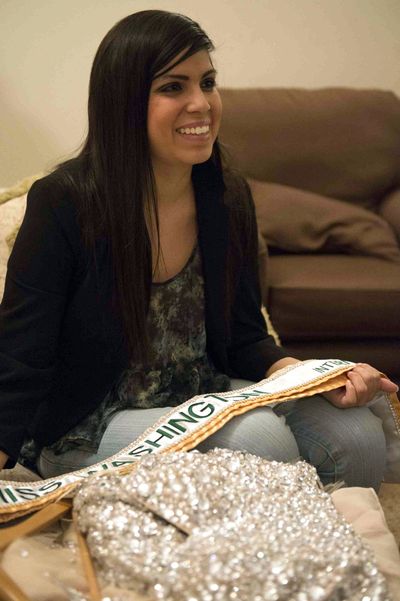Rodarte uses pageant title as platform to educate others on gang violence

One day when she was in elementary school, Erica Rodarte was sitting on the counter in her family’s two-bedroom trailer, helping her father bake a cake, when she heard a knock on the door.
Rodarte watched as a man in a long brown pea coat and two police officers arrested her father. In the late 1990s, he was arrested three times for theft of a firearm, robbery in the second degree and residential burglary, according to the Washington State Patrol.
“I was like, ‘Why are they taking him?’ ” said Rodarte, now a 23-year-old education student at Washington State University. “That just happened so many times.”
Rodarte grew up surrounded by violence. In Toppenish, Wash., a town of less than 10,000 people in Yakima County, Rodarte witnessed drive-by shootings, drugs and thefts. Her father and older brother were both in a local gang, she said.
“If you were to go to that trailer now, you can definitely see the bullet holes,” she says. “Our front window is cracked. It’s covered in plastic bags. That was home. That was definitely my home.”
But now, Rodarte has replaced that world with a stage, a crown and a sash. In December, Rodarte was named Miss Washington U.S. International.
She will also meet with residents and local law enforcement to discuss her cause, drawing attention to her campaign as Miss Washington U.S. International. She is preparing for the national pageant in June in Orlando, Fla.
Rodarte has used her pageant title to wage a public campaign against the same gang violence that defined so much of her childhood. Her activism has further alienated her from her father, Jesse D. Rodarte, who is currently incarcerated at Monroe Correctional Facility for armed robbery.
“To be in the pageant world, you definitely are set up to have a platform, to have a cause to implement something that you’re so passionate about,” Rodarte said.
Rodarte’s passion began in that Toppenish trailer, which would flood with gang members when Rodarte’s mother went to work.
“That is her dream,” Maria Huizar, Rodarte’s mother, said. “She just wants to do it because she knows where she comes from is nothing but gangs, and she wants to show these young girls, ‘this is what I’ve done.’”
Rodarte’s father spent most of her childhood in jail, she said.
“I remember singing songs to him over the phone while he was in jail,” she said. “I remember always visiting him. There was big glass, and I remember seeing him on the other side.”
At 14, Rodarte left Toppenish, moving to Kent to live with family and friends.
Four years later, Rodarte’s life changed. The high school senior discovered pageantry when she saw a picture of Michelle Font, Miss Washington USA 2008 and a graduate of Rodarte’s high school, displayed on a billboard.
“Just by seeing her in a crown, seeing it on the wall, that’s the power that it really does for young women,” Rodarte says.
Font was also the director of a scholarship program for Hispanic women, Miss Hispanic Seafair. Rodarte applied and her pageant career began. It was there that now pageant veteran learned to walk, interview and model.
But pageantry wasn’t just about the “glitz and glamour,” Rodarte said. It was a starting point for her to begin fighting the gang violence that had defined her childhood.
After high school, Rodarte found another outlet for her platform: AmeriCorps.
For two years, Rodarte balanced pageantry with service, working with the Latchkey After School Program in Adams Elementary School in Yakima. There, Rodarte saw firsthand the impact of violence on children.
One little girl would always ask for her mom, Rodarte says, but the girl’s mom would never come.
“I know she’s lying when she says she’s going to come see me,” Rodarte recalled the girl saying to her.
It was also during that time that Rodarte stopped tolerating her father’s behavior. Where she once asked police why they took her father away, she stood aside as police officers arrested him.
“At 19, they took my dad again, and at that point, I was like ‘Take him,’ ” she says.
Rodarte continued to pursue pageantry during her time in AmeriCorps and her first two years of college at Eastern Washington University. It took her seven times to achieve a state title.
Rodarte’s living a different life. She’s replaced her family’s trailer with a room in the Alpha Omicron Pi sorority house at WSU, where she holds an office. Where she once doubted whether she’d graduate high school, she’s planning on pursuing a job as a high school principal.
Rodarte has stopped talking to her father and brother.
“They definitely despise me,” she says.
She’s different from them, she said, because she’s fighting against what they represent.
She’s also looking for more opportunities to work with displaced youth in the Spokane and Yakima areas, hoping to apply her platform to those places that need it, she says.
And though the crown won’t be awarded until June, Rodarte said she’s going to make a difference, pageants or not.
“I don’t look at this crown as an accessory,” she said. “I look at it as a microphone. It brings voice.”